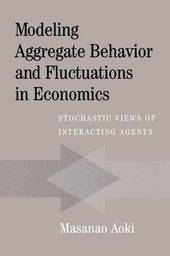
|
Modeling Aggregate Behavior and Fluctuations in Economics: Stochastic Views of Interacting Agents
Paperback / softback
Main Details
| Title |
Modeling Aggregate Behavior and Fluctuations in Economics: Stochastic Views of Interacting Agents
|
| Authors and Contributors |
By (author) Masanao Aoki
|
| Physical Properties |
| Format:Paperback / softback | | Pages:280 | | Dimensions(mm): Height 229,Width 152 |
|
| Category/Genre | Econometrics
Probability and statistics |
|---|
| ISBN/Barcode |
9780521606196
|
| Classifications | Dewey:330.015195 |
|---|
| Audience | | Professional & Vocational | |
|---|
| Illustrations |
Worked examples or Exercises
|
|
Publishing Details |
| Publisher |
Cambridge University Press
|
| Imprint |
Cambridge University Press
|
| Publication Date |
9 September 2004 |
| Publication Country |
United Kingdom
|
Description
This book has two components: stochastic dynamics and stochastic random combinatorial analysis. The first discusses evolving patterns of interactions of a large but finite number of agents of several types. Changes of agent types or their choices or decisions over time are formulated as jump Markov processes with suitably specified transition rates: optimizations by agents make these rates generally endogenous. Probabilistic equilibrium selection rules are also discussed, together with the distributions of relative sizes of the bases of attraction. As the number of agents approaches infinity, we recover deterministic macroeconomic relations of more conventional economic models. The second component analyzes how agents form clusters of various sizes. This has applications for discussing sizes or shares of markets by various agents which involve some combinatorial analysis patterned after the population genetics literature. These are shown to be relevant to distributions of returns to assets, volatility of returns, and power laws.
Author Biography
Masanao Aoki is Professor Emeritus in the Department of Economics at the University of California, Los Angeles. He also held professorial appointments at the Institute for Social and Economic Research at Osaka University, Tokyo Institute of Technology, and the University of Illinois. Professor Aoki is a past President of the Society for Economic Dynamics and Control, a Fellow of the Econometric Society, and a Fellow of the IEEE Control Systems Society. Currently Associate Editor of the journal Macroeconomic Dynamics published by Cambridge University Press, he also served as Editor of the Journal of Economic Dynamics and Control and the International Economic Review, and Associate Editor of the IEEE's Transaction of Automatic Control, Information Sciences, and the Journal of Mathematical Analysis and Application. Professor Aoki is the author or editor of ten books, including New Approaches to Macroeconomic Modeling: Evolutionary Stochastic Dynamics, Multiple Equilibria, and Externalities as Field Effects (Cambridge University Press, 1996).
Reviews'This is a most welcome treatment of stochastic dynamics in economic models, and its significance for theoretical and applied economics ... Professor Aoki has provided a self-contained description of all necessary and relevant concepts of the modeling toolbox, including key stochastic dynamics concepts such as the Master Equation (the backward Kolmogorov-Chapman Equation), the Fokker Planck equation, Jump Markov Processes, Random Partitions and Combinatorial Randomness.' Asia Pacific Journal of Management 'Once again Masanao Aoki has written a book ahead of its time. This time he applies techniques popular in the hard sciences, but alien to most economists, to analyze the dynamic interaction of a large (finite) number of agents (or entities.) He characterizes types of agents by their decisions and the movement between types as endogenous transition probabilities. Aoki uses random combinatorial analysis to describe the distribution of types, and the backward Chapman-Kolmogorov equations to describe the aggregate dynamics. This is an innovative approach to characterize a complicated dynamic stochastic economic environment.' Roger Craine, University of California, Berkeley 'In recent years, the economics profession has experienced a growing interest in modeling economic phenomena as the outcome of the interactions of heterogeneous individuals. Although interaction and heterogeneity appear to be natural and pervasive features of modern economies, the formerly dominating tradition of modeling representative agents has eschewed both to a large extent. However, the increasing awareness of the importance of these features also requires the adaptation or development of appropriate technical tools. Professor Aoki has done a great service to the profession by providing a unified treatment of methods for stochastic modeling of large collections of heterogeneous agents. As a companion and sequel to his seminal New Approaches to Macroeconomic Modeling, the present volume both adds advanced material and demonstrates the power of the statistical approach by applying it to important classes of economic models. With its unique coverage and rigorous presentation, the book will immediately become a standard reference in the exciting new area of interacting agent modeling in economics.' Thomas Lux, University of Kiel 'Economists have long taken optimization as first principles in economics. This belief has lead many to the Walrasian or the intertemporal utility maximization model, and has fundamentally changed macroeconomics. Unfortunately, the standard model such as real business cycle theory looks hopelessly unrealistic. It may sound like a paradox that the model which is based on explicit maximization of the representative agent is so unsatisfactory as a macro model. Professor Aoki's book gives us a good answer to this question, and at the same time, provides us with a new methodology in macroeconomics. He convincingly argues that Jump Markov Process is a powerful and fruitful tool in macroeconomics. Professor Aoki explains the method, and also provides examples. The book will be remembered as a landmark.' Hiroshi Yoshikawa, University of Tokyo
|